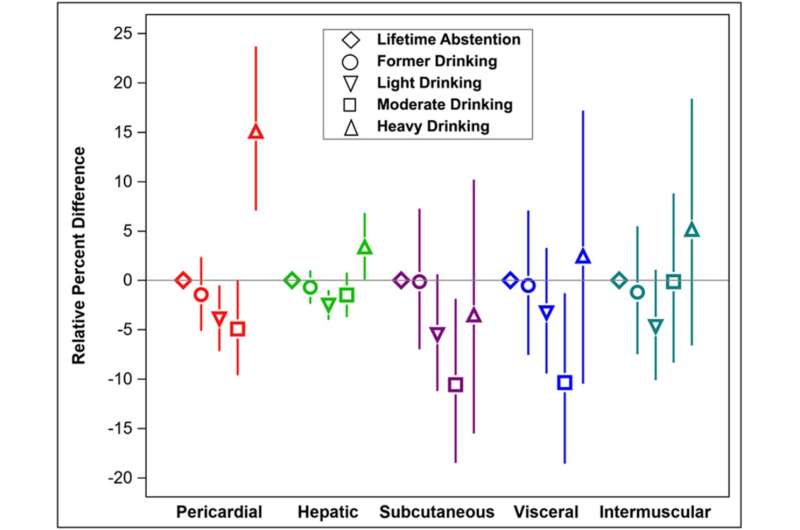This article has been reviewed according to Science X's editorial process and policies. Editors have highlighted the following attributes while ensuring the content's credibility:
fact-checked
peer-reviewed publication
trusted source
proofread
Study finds heavy alcohol consumption linked to ectopic fat

Does drinking an excessive amount of alcohol increase the amount of fat deposits in the body? The answer is yes according to new findings from the Multi-Ethnic Study of Atherosclerosis (MESA). Researchers at Wake Forest University School of Medicine found that heavy alcohol consumption is associated with higher levels of ectopic fat, which refers to fat around organs such as the heart, liver and intestines.
The study appears online in the Journal of the American Heart Association.
"Research shows that an excessive amount of alcohol is not good for heart health," said Richard Kazibwe, M.D., assistant professor of internal medicine at Wake Forest University School of Medicine and lead author of the study. "Pericardial fat, or fat around the heart, is also associated with an increased risk of cardiovascular disease, so we wanted to better understand how alcohol intake might contribute to that risk."
MESA was initiated in 1999 to study the characteristics of subclinical cardiovascular disease—disorders of the heart or blood vessels detected prior to the appearance of any clinical signs or symptoms—and the risk factors that predict progression to actual cardiovascular disease. The study has included more than 6,500 people of European, African, Hispanic and Asian descent who were between the ages of 45 and 84 and healthy at the time of enrollment.
MESA participants completed a personal-history questionnaire to assess alcohol consumption and were placed in one of the following categories:
- Lifetime abstainers
- Former drinkers
- Light drinkers (less than one alcoholic drink per day)
- Moderate drinkers (one to two alcoholic drinks per day)
- Heavy drinkers (more than two alcoholic drinks a day)
- Binge drinkers (five or more alcoholic drinks in a single day without concurrent light, moderate or heavy alcohol drinking)
Computerized tomography (CT) scans were performed in a subset of participants, which enabled the research team to analyze data on the amount of fat that can build up in certain locations such as around the heart (pericardial fat) and in the liver (hepatic fat).
"The CT scans allow us to see deeper in the body to measure and gain a better understanding of how fat is distributed in the body. Body fat distribution can explain the differences in cardiovascular risk beyond the traditional measure of obesity such as body mass index. For instance, we know that two individuals with similar body mass index can have different cardiovascular risks," Kazibwe said.
The research team found that heavy alcohol consumption and binge drinking, compared to participants who never had alcohol, was associated with significantly higher pericardial fat. Results were similar for other ectopic depots with the strongest associations for pericardial and hepatic.
"Interestingly, the lowest levels of ectopic fat were seen in people who reported light to moderate intake of alcohol," Kazibwe said.
When compared with beer and liquor or "hard" spirits, consumption of wine appeared to be less associated with higher pericardial fat, but according to Kazibwe, one possible explanation might be the benefits of polyphenols, beneficial compounds found in wine.
"Also, there are other characteristics to consider such as diet and exercise," Kazibwe said. "Wine drinkers might have better access to health care and have healthier lifestyles than non-wine drinkers."
Overall, the relationship between alcohol consumption and ectopic fat exhibited a J-shaped pattern, a common way to visualize the marked increase in health risks relative to alcohol consumption.
Kazibwe said that multiple previous studies have reported a J-shaped relationship between alcohol consumption and cardiovascular risk where low-moderate alcohol consumption is tied to the lowest cardiovascular risks, while excessive alcohol intake is linked to a higher risk.
"These findings are significant because both excessive alcohol intake and excess ectopic fat accumulation are known risk factors for cardiovascular disease," Kazibwe said. "It is also important to emphasize that given the well-documented health concerns caused by excessive alcohol consumption, it is important that people are aware of these potential risks."
Cashell Jaquish, Ph.D., a genetic epidemiologist and program officer at the NHLBI, agreed. "These findings further solidify the relationship between drinking and cardiovascular risk and shed light on specific sub-clinical disease associated with excessive alcohol intake," said Jaquish, who works with the MESA study. "Additional studies are needed to further clarify the role of ectopic fat distribution in the relationship between alcohol consumption and cardiovascular disease," she noted.
More information: Richard Kazibwe et al, Association Between Alcohol Consumption and Ectopic Fat in the Multi‐Ethnic Study of Atherosclerosis, Journal of the American Heart Association (2023). DOI: 10.1161/JAHA.123.030470





















